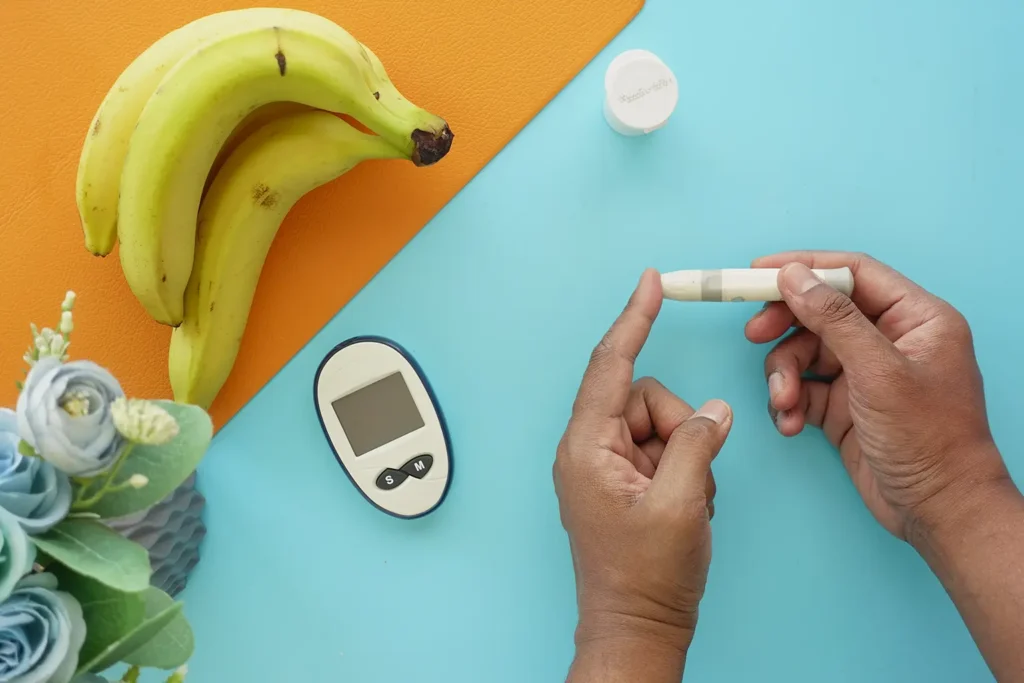
We are looking at how diabetes impacts your oral health and can lead to teeth problems. It’s essential to recognize the interconnectedness of your overall health with your dental health in general and explore how making healthy choices can significantly benefit both areas of your health and well-being.
The Diabetes-Oral Health Connection
Diabetes is a chronic condition that affects how your body processes sugar (glucose). High blood sugar levels can lead to various health complications, including issues with your mouth. Here are a few key connections between diabetes and your oral well-being:
Gum Disease (Periodontitis)
People with diabetes are at an increased risk of developing gum disease. This condition, also known as periodontitis, can cause inflammation and damage to the soft and hard tissues supporting your teeth. It can lead to gum recession, tooth loss, and even chronic bad breath (halitosis). The inflammation and infections common in gum disease are exacerbated by diabetes, as high blood sugar levels can weaken the immune system, making it harder to fight off bacterial infections in the gums.
Dental Cavities
Diabetes can affect the flow of saliva in your mouth, which is essential for maintaining good oral health. Reduced saliva production can lead to a dry mouth, making it more prone to dental cavities and infections. Saliva helps wash away food particles and neutralizes acids produced by bacteria in the mouth. When saliva flow is compromised, these acids can accumulate and erode tooth enamel, leading to cavities.
Delayed Healing
Diabetes can slow down the body’s natural ability to heal itself. This means that if you have oral surgery, tooth extractions, or other dental procedures, you may take longer to recover and may also be at a higher risk of complications. High blood sugar levels can impair blood flow, reducing the supply of oxygen and nutrients needed for healing. This delayed healing can also increase the risk of infection at surgical sites.
Thrush
Thrush, a fungal infection in the mouth, is more common in people with diabetes. High sugar levels in the mouth provide an ideal environment for the fungus to thrive. Thrush appears as white patches on the tongue, inner cheeks, roof of the mouth, and throat. It can cause discomfort and difficulty swallowing if left untreated.
Loose and Broken Teeth
One of the more severe complications of diabetes is the potential for loose and broken teeth. High blood sugar levels can damage the blood vessels that supply nutrients to the gums, leading to gum disease. As gum disease progresses, it can cause the gums to pull away from the teeth, creating pockets that become infected. This infection can deteriorate the bone and connective tissue that hold teeth in place, resulting in loose teeth. In advanced stages, this weakening of the dental structure can cause teeth to break or fall out.

Healthy Choices for Both Diabetes and Oral Health
The good news is that many lifestyle choices that help manage diabetes also promote better oral health. Here are some ways to make healthy choices that benefit both:
Control Blood Sugar Levels
Properly managing elevated blood sugar is the cornerstone of diabetes care. By doing so, you reduce your risk of developing oral health issues. Regular monitoring, medication management, and lifestyle adjustments are key. Maintaining blood sugar levels within the target range helps prevent damage to blood vessels and nerves, reducing the risk of complications in the mouth.
Stick to a Balanced Diet
A nutrient-rich diet comprised of fruits, vegetables, lean proteins, and whole grains benefits both diabetes management and your oral health. Avoid excessive sugar and limit starchy foods that can contribute to dental problems. Consuming a balanced diet helps control blood sugar levels and provides essential nutrients that support overall health and the health of your teeth and gums.
Daily Oral Hygiene
Brush your teeth at least twice a day and floss daily. This simple system helps remove plaque and prevent gum disease from invading your smile. Be sure to use a toothbrush with soft bristles, as aggressive brushing can harm your gums. Using fluoride toothpaste can help strengthen tooth enamel and protect against cavities.
Regular Dental Checkups
Consistent dental checkups are crucial. Our dentist can monitor your oral health, spot issues early, and offer guidance on proper oral care. Regular cleanings remove plaque and tartar buildup that can lead to gum disease and cavities. During checkups, your dentist can also provide personalized advice on managing your oral health in conjunction with diabetes.
Quit Smoking
Just as smoking is harmful to your oral health, it can also exacerbate the complications of diabetes. If you currently smoke, seek support to help you quit. Smoking reduces blood flow to the gums, impairing healing and increasing the risk of infections. Quitting smoking can significantly improve both your oral health and overall health.
Stay Hydrated
Drinking lots of water throughout your day helps combat dry mouth, reducing your risk of dental cavities from tooth decay. Staying hydrated also helps maintain saliva flow, which is essential for protecting your teeth and gums from harmful bacteria and acids.
Manage Stress Levels
Stress can seriously affect blood sugar levels and your oral health. Look for healthy ways to manage your stress levels by incorporating exercise, mindfulness, or hobbies you enjoy during your week. Reducing stress can help you maintain better control over your diabetes and reduce the risk of oral health issues.

Book Your Appointment
It is always important to take good care of your body. Making healthy choices benefits both diabetes and oral health, boosting overall quality of life. Prioritize your oral health for a brighter and healthier future. If it is time for you to see our dentist for a checkup and cleaning, we would like to invite you to give us a call to book a reservation. Your smile and body will thank you!
Conclusion
Understanding the connection between diabetes and oral health is crucial for maintaining a healthy lifestyle. By managing your diabetes effectively and adopting good oral hygiene practices, you can prevent many of the oral health issues associated with this condition. Remember, your dental health is an integral part of your overall well-being, and taking proactive steps can lead to a healthier, happier life.
If you have any concerns about how diabetes may be affecting your oral health or if you need to schedule a dental appointment, Family Dental Group is here to help. Contact us today to learn more about how we can support your dental and overall health needs.

